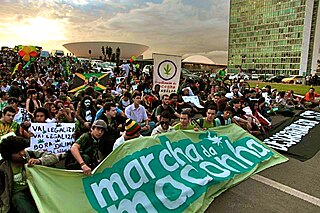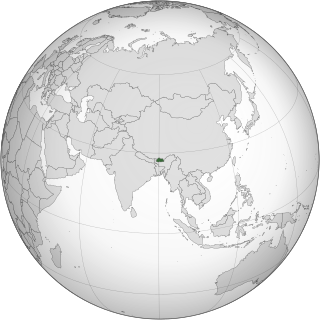Related Research Articles

Cannabis is a genus of flowering plants in the family Cannabaceae. The number of species within the genus is disputed. Three species may be recognized: Cannabis sativa, C. indica, and C. ruderalis. Alternatively, C. ruderalis may be included within C. sativa, or all three may be treated as subspecies of C. sativa, or C. sativa may be accepted as a single undivided species. The genus is widely accepted as being indigenous to and originating from Asia.

Tetrahydrocannabinol (THC) is a cannabinoid found in cannabis. It is the principal psychoactive constituent of cannabis and one of at least 113 total cannabinoids identified on the plant. Although the chemical formula for THC (C21H30O2) describes multiple isomers, the term THC usually refers to the delta-9-THC isomer with chemical name (−)-trans-Δ9-tetrahydrocannabinol. It is a colorless oil.

The legality of cannabis for medical and recreational use varies by country, in terms of its possession, distribution, and cultivation, and how it can be consumed and what medical conditions it can be used for. These policies in most countries are regulated by three United Nations treaties: the 1961 Single Convention on Narcotic Drugs, the 1971 Convention on Psychotropic Substances, and the 1988 Convention Against Illicit Traffic in Narcotic Drugs and Psychotropic Substances. Cannabis was reclassified in 2020 to a Schedule I-only drug under the Single Convention treaty, with the schedules from strictest to least being IV, I, II, and III. As a Schedule I drug under the treaty, countries can allow the medical use of cannabis but it is considered to be an addictive drug with a serious risk of abuse.

Cannabidiol (CBD) is a phytocannabinoid, one of 113 identified cannabinoids in cannabis plants, along with tetrahydrocannabinol (THC), and accounts for up to 40% of the plant's extract. Medically, it is an anticonvulsant used to treat multiple forms of epilepsy. It was discovered in 1940 and, as of 2024 clinical research on CBD included studies related to the treatment of anxiety, addiction, psychosis, movement disorders, and pain, but there is insufficient high-quality evidence that CBD is effective for these conditions. CBD is sold as an herbal dietary supplement and promoted with yet unproven claims of particular therapeutic effects.

In the United States, the removal of cannabis from Schedule I of the Controlled Substances Act, the category reserved for drugs that have "no currently accepted medical use", is a proposed legal and administrative change in cannabis-related law at the federal level. After being proposed repeatedly since 1972, the U.S. Department of Justice initiated 2024 rulemaking to reschedule cannabis to Schedule III of the Controlled Substances Act. The majority of 2024 public comments supported descheduling, decriminalizing, or legalizing marijuana at the federal level.

Cannabis, commonly known as marijuana, weed, and pot, among other names, is a non-chemically uniform drug from the cannabis plant. Native to Central or South Asia, the cannabis plant has been used as a drug for both recreational and entheogenic purposes and in various traditional medicines for centuries. Tetrahydrocannabinol (THC) is the main psychoactive component of cannabis, which is one of the 483 known compounds in the plant, including at least 65 other cannabinoids, such as cannabidiol (CBD). Cannabis can be used by smoking, vaporizing, within food, or as an extract.
The drug policy of Germany is considered to be one of the most lenient among European Union (EU) countries. Policies vary depending on the state.
Gonzales v. Raich, 545 U.S. 1 (2005), was a decision by the U.S. Supreme Court ruling that, under the Commerce Clause of the U.S. Constitution, Congress may criminalize the production and use of homegrown cannabis even if state law allows its use for medicinal purposes.

Cannabis in Brazil is illegal but decriminalized, while possession and cultivation of personal amounts and for private use were de-penalized in 2006. In 2024, Brazil's Supreme Court ruled that Brazilians can possess and transport up to 40 grams of cannabis for their own consumption. However, the sale continues to be considered a crime. Use of cannabis medications is allowed for terminally ill patients or those who have exhausted other treatment options. It is also possible to import, manufacture and sell cannabis-based medicines.
Cannabis in Dominica is a Class B drug to cultivate, sell or possess. This means that possession is punishable by 12 months and EC$12,000 (summary) or 2 years and EC$20,000. Supplying, production, or importation are punishable by 3 years and EC$100,000 (summary) or 14 years and EC$200,000.

Cannabis in Bhutan is illegal, but grows prolifically in the country and has multiple traditional uses, such as feeding pigs and producing textiles.
Cannabis in New Caledonia is illegal, but is cultivated illicitly. Sources note that "hard drugs" are rare in New Caledonia, and their drug issues are primarily confined to cannabis, with local Kanak chiefs being anti-drug and working to eradicate cannabis plantations.
Cannabis in Gibraltar is illegal, but due to its proximity to North Africa and to mainland Europe, the area around Gibraltar in Spain is frequently used for cannabis trafficking. Gibraltar itself is not a usual destination for drug smuggling from Morocco as it only has a small population and customs controls with Spain make it difficult to move the merchandise further on into Europe. Gibraltarian authorities take a hard line on drug smuggling and prohibited the use of fast speed boats in its waters in 1995, a measure introduced by Spain in 2018.
Cannabis in Bolivia is illegal, but cultivated illicitly, mostly for domestic consumption. Bolivian law treats cannabis equally to cocaine, with possession of one gram punishable by 10–25 years in prison.
Cannabis in Eswatini (Swaziland) is a traditional crop called insangu in Swazi. The plant is subject to drug control and remains illegal in almost all cases.
Cannabis in Mozambique is illegal; the drug is locally referred to as suruma.
Cannabis in the Republic of the Congo is illegal. Cannabis is known locally as mbanga.
Cannabis in the Democratic Republic of the Congo is legal for industrial, medicinal and scientific use. It continues to be illegal for recreational use.
Cannabis in Haiti is illegal with severe punishments for the production, sale, and possession of marijuana for medicinal or recreational purposes.
The removal of cannabis and cannabis resin from Schedule IV of the Single Convention on narcotic drugs, 1961 is a change in international law that took place from 2019 to 2021, on the basis of a scientific assessment by the World Health Organization.
References
- ↑ William R. Brownfield (1 May 2011). International Narcotics Control Strategy Report: Volume I: Drug and Chemical Control. DIANE Publishing. pp. 286–. ISBN 978-1-4379-8272-5.